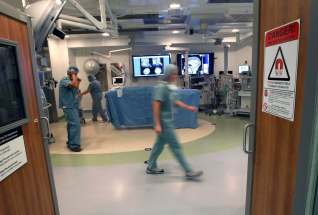Spent, fearful nurses sound alarm at HSC Inadequate staffing, untenable workload, threat of violence degrading patient care at Manitoba's largest hospital, they say
Read this article for free:
or
Already have an account? Log in here »
To continue reading, please subscribe:
Monthly Digital Subscription
$0 for the first 4 weeks*
- Enjoy unlimited reading on winnipegfreepress.com
- Read the E-Edition, our digital replica newspaper
- Access News Break, our award-winning app
- Play interactive puzzles
*No charge for 4 weeks then price increases to the regular rate of $19.00 plus GST every four weeks. Offer available to new and qualified returning subscribers only. Cancel any time.
Monthly Digital Subscription
$4.75/week*
- Enjoy unlimited reading on winnipegfreepress.com
- Read the E-Edition, our digital replica newspaper
- Access News Break, our award-winning app
- Play interactive puzzles
*Billed as $19 plus GST every four weeks. Cancel any time.
To continue reading, please subscribe:
Add Free Press access to your Brandon Sun subscription for only an additional
$1 for the first 4 weeks*
*Your next subscription payment will increase by $1.00 and you will be charged $16.99 plus GST for four weeks. After four weeks, your payment will increase to $23.99 plus GST every four weeks.
Read unlimited articles for free today:
or
Already have an account? Log in here »
Hey there, time traveller!
This article was published 03/01/2020 (2168 days ago), so information in it may no longer be current.
Excessive amounts of overtime. Missed breaks. More frequent violent incidents. Lack of beds. Lack of staff. Lack of supplies. Unsafe patient ratios. Fatigue. Fear of speaking out.
Those are some of the issues the Free Press heard about during interviews this week with five nurses who have worked or are currently working at Health Sciences Centre. Four of the five agreed to speak under condition of anonymity, so as not to jeopardize their jobs.
The Manitoba Nurses Union is considering “greylisting” the province’s largest hospital due to work conditions they deem inappropriate and unsafe. Greylisting would mean nurses are advised against taking new jobs at HSC until the environment improves.
Junanne Hunter, 64, retired from HSC’s emergency department in October, months earlier than originally planned.
Hunter said work in the ER “had become so unmanageable,” her doctor gave her a sick note, enabling her to leave two weeks early. She finished her nearly 40-year nursing career while on stress leave.
Hunter spent about 34 of her nursing years in adult emergency and said the biggest problem was the number of admitted patients clogging up ER beds. Towards the end, the issue evolved into sometimes having beds available elsewhere in the hospital, but without nurses to staff them, she said.
A shortage of intensive-care unit nurses particularly affected the ER, she added, forcing them to monitor resuscitation beds they weren’t necessarily well trained to do.
“I think there’s a lot of nurse disengagement going on, certainly in my department (there was),” Hunter said.
“Because for nurses, if you can’t come and look after your patients properly, it’s like a knife to your heart. You have to figure out ‘how am I mentally going to cope with this?’ You take a step back and you don’t sort of involve yourself so much in your patients’ care. And I think it’s likely a big problem that even nurses won’t talk about.”

Another nurse currently working in the ER said the volume of methamphetamine use staff deal with is also a major concern.
People experiencing meth psychosis need constant supervision and are often strapped to beds. In many cases anti-psychotic drugs are administered intravenously because patients refuse to take oral medication, the nurse said.
“I think the well-documented methamphetamine crisis throughout the city has increased the ability for us to get injured at work by an uncontrollable…,” she said, trailing off. “I can’t even describe it. It’s chaotic with the amount of methamphetamine patients we get.”
The nurses interviewed said each time another Winnipeg hospital emergency department or urgent-care centre has closed or converted since 2017, their workload has worsened.
HSC is also supposed to be a training ground for medical students. But nurses the Free Press spoke to said they can’t adequately coach junior staff when they’re as busy as they currently are.
“We don’t want to be in the news. But we need to protect our patients,” the working ER nurse said, breaking down in tears. “I’m sorry. This is my life, this is my livelihood. It’s very stressful most days.”
***
A nurse working in the hemodialysis unit said patients are taking notice of nurses’ intense workloads, asking how they can help or where they can complain.
The nurse showed images of artwork drawn by patients who noted the constant use of the term “double double” on the ward, referring to nurses working “double-double” shifts, not drinking coffee.
The dialysis nurse said nurse-to-patient ratios are increasingly out of whack. When they told superiors they felt unsafe taking on more patients, the response was reportedly that if they refused, the additional patients would become the responsibility of equally overburdened colleagues.
“I think the well-documented methamphetamine crisis throughout the city has increased the ability for us to get injured at work by an uncontrollable… I can’t even describe it. It’s chaotic with the amount of methamphetamine patients we get.”
“Nowadays so much stuff is done outpatient that the patients that do end up in hospital overnight are very, very sick,” the nurse said. “So whereas a long time ago, you could have five clients — three that are really sick and then two that are all right and manageable — now you’ll have seven patients and they’ll all be extremely ill and pretty complicated.”
At Children’s Hospital, one nurse said staff are so pressed for time, they can’t always give assessments of patients as thorough as they would like. They described checking only for symptoms present, rather than subtleties that could clue them in to underlying health issues.
“So we get patients who get sicker. Things get missed. Or patients get sicker while they’re there (at the hospital),” the nurse said.
That nurse reported being reprimanded by a boss for sitting down on the job during a few spare moments. Many of the nurses the Free Press spoke to reported missing breaks, often because they felt they couldn’t leave their patients’ sides.
“I won’t watch my co-worker drown, because they don’t deserve that either,” the Children’s nurse said.
Nurses said supplies have also been dwindling, including some sizes of children’s diapers, crib sheets, IV bags and food items, such as Popsicles, at Children’s. In dialysis, some gowns, pads and bed dressings are often missing, said the nurse working there.
“So we get patients who get sicker. Things get missed. Or patients get sicker while they’re there (at the hospital).”
The Children’s nurse said staff feel as though “we’re barrelling towards something terrible,” and many have started looking for new jobs. Still, more are afraid to go public.
“I feel like the public deserves to know (what’s happening). I get paid with peoples’ tax dollars. These kids deserve the absolute best care.”
***
Over at the Women’s Hospital, a nurse reported colleagues are seeking out malpractice insurance to protect themselves in case something goes awry.
Since moving to the long-delayed new facility at Sherbrook and William Dec. 1 — and effectively quadrupling the workplace size — nurses are running off their feet, counting as many as 19,000 steps per shift, the nurse said.
When short-staffed supervisors call for reinforcements, many nurses let the phone ring, tired of being asked to work overtime. They’re also trying to retain what they’ve recently had to learn in order to operate several dozen new pieces of equipment.
“I think also the violence that’s occurring, not just with the crystal meth, but there’s other forms of violence occurring that are seen on a daily basis. It could be physical, it could be verbal. Those things really need to start to be addressed,” the nurse said.
Nurses said they would like to see HSC management and the provincial government react swiftly to their concerns.
As retired nurse Junanne Hunter put it, there is no use “rearranging deck chairs on the Titanic” with small tweaks.
“I don’t really remember a time over the last 34 years where I felt like we’re really sinking,” she said. “We’ve already hit the iceberg, maybe we should stop rearranging these deck chairs and all jump on a lifeboat now… we’re on the slippery slope.”
After initially saying it would provide someone to respond to the nurses’ concerns Friday, Shared Health did not make anyone available for an interview. In an email, a spokesperson said they wanted to review each concern outlined and thought it best to “reschedule the interview for next week so that we are able to appropriately look into these and have the most accurate information available.”
“I think also the violence that’s occurring, not just with the crystal meth, but there’s other forms of violence occurring that are seen on a daily basis. It could be physical, it could be verbal. Those things really need to start to be addressed.”
Instead, Shared Health provided a lengthy general statement about the importance nurses play within the health-care system.
“At HSC, the safety of our staff and patients is a top priority. Many of the challenges raised with us by nursing staff are long-standing issues that both Shared Health and HSC leadership are committed to working together to address collaboratively with our staff. While some challenges can be addressed imminently through site-level changes, others will require a system level approach over time,” the statement said.
“We remain committed to ongoing discussions with nurses from various practice settings — and their union in the months ahead. We look forward to providing more information in the near future about initiatives planned or already underway that will enable our health system to plan resourcing more effectively and support our staff to continue to deliver safe, and quality patient care.”
jessica.botelho@freepress.mb.ca
Twitter: @_jessbu













